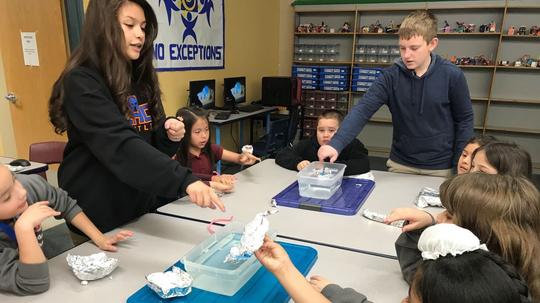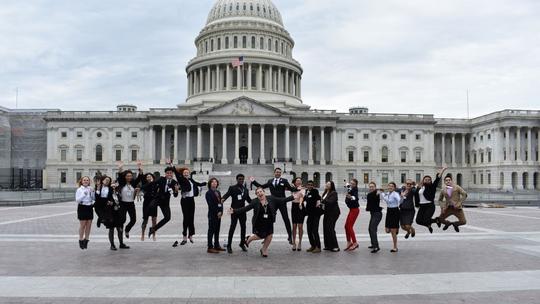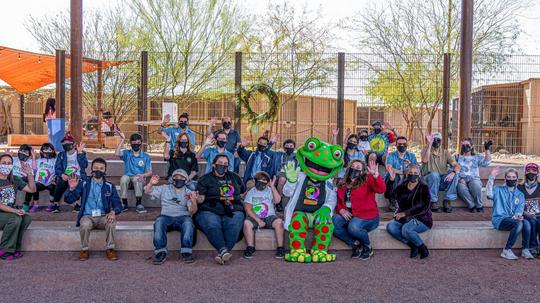
As Arizona continues to attract record-breaking jobs and investments from leading, high-tech companies, one homegrown program stands out as a global model for fueling the next generation of science and technology professionals.
The Chief Science Officer (CSOs) program was launched in 2015 by Jeremy Babendure, Ph.D. and his team at the SciTech Institute, in partnership with the Arizona Commerce Authority and Arizona Technology Council.
The first-of-its-kind program empowers sixth- through 12th-grade students to be STEM ambassadors who champion communication, interest, and engagement in STEM and innovation for their schools, the community and private industry. In just six years, the program has expanded into 11 other states, along with international chapters in Kenya, Kuwait and Mexico. The CSO program currently consists of about 1,000 students – 600 in the U.S. and 400 internationally.
“The CSO program is an innovative, Arizona-grown model that is transforming the state’s STEM climate and receiving incredible national recognition,” Arizona Gov. Doug Ducey said in 2016. “I’m excited to see Arizona’s next generation of leaders tackle civic engagement and I look forward to hearing their vision for shaping Arizona’s future.”
The CSOs have been strongly supported by the governor and his office of education, which has hosted capitol summits to solicit innovation and policy ideas from the youth STEM ambassadors.

Arizona CSOs have also presented ideas at the White House, met with former U.S. Chief Technology Officer Megan Smith and presented at National Science Foundation conferences.
Smith, a former Google executive, hailed the program as a national blueprint.
“I think they have figured out a model that could be really important to the future of our country,” Smith told CSOs on a visit to Arizona. “You guys are the founders of this idea.”
One of the pillars of the CSO program is to encourage students to pursue a career in science and technology, while empowering them to use their STEM skills to make a positive difference in their world.
For students like Nikhil Johnson, a junior at North High School in Phoenix, the CSO experience has been life-changing.
“Being a child who migrated to the U.S., I had no idea how to fit into my community, and it became very difficult to get accustomed to the new lifestyle,” he said. “The CSO program helped me to set goals that would foster my commitment to excellence and craft an extraordinary skill set.”
As a CSO, he’s lobbied for the importance of student voices in STEM-related decisions to the White House Office of Science and Technology Policy (OTSP), distributed laptops to disadvantaged students, helped set up a virtual coding night for children, and started an environmental club.

The CSOs attend leadership training summits and develop educational projects, such as presenting STEM demonstrations to younger students, starting school clubs, and organizing community events or campus challenges.
A founding principle of the program is that students should be at the forefront of conversations with companies, communities and decision-makers. This principle has led to the growth of the program with more CSOs making a difference in their communities.
“The idea was, ‘how do we get kids to start taking leadership roles and connect with adults in the community to share what they think we should be doing,’” said Babendure. “A lot of people talk about the importance of students, but then you look around the room and you never see a kid in sight.”
The CSO program flips that script, Babendure said, and allows companies in Arizona and beyond to have “meaningful connections” with future STEM professionals.
Continuing to develop the next generation workforce is a priority in Arizona, which is home to more than 200,000 tech industry jobs, with wages reaching nearly $24 billion. Supporting this ecosystem not only puts future STEM workers on a path to quality employment but also lays the foundation for sustainable economic growth in Arizona.
“The (CSO Program) is crucial for Arizona’s future,” said Bob Witwer, a former Honeywell Aerospace executive and chairman of the Arizona Technology Council Foundation. “This organic catalyst can spark a lifelong passion early in a child’s life.”
Encouraging students to pursue a career in STEM also sets them up for a future with higher wages. The latest U.S. Bureau of Labor Statistics figures show STEM occupations had an annual median wage of $89,780, more than double the U.S. median of $41,900 for all occupations.
Whether it changes lives for the better or strengthens the pipeline of future STEM workers, the Arizona-grown CSO program is cultivating an entrepreneurial mindset that spans from classroom to career, across the globe.
To learn more about the SciTech Institute, visit azscitech.com.
The Arizona Commerce Authority (ACA) is the state's leading economic development organization with a streamlined mission to grow and strengthen Arizona's economy. For more information, please visit azcommerce.com and follow the ACA on Twitter at @azcommerce.